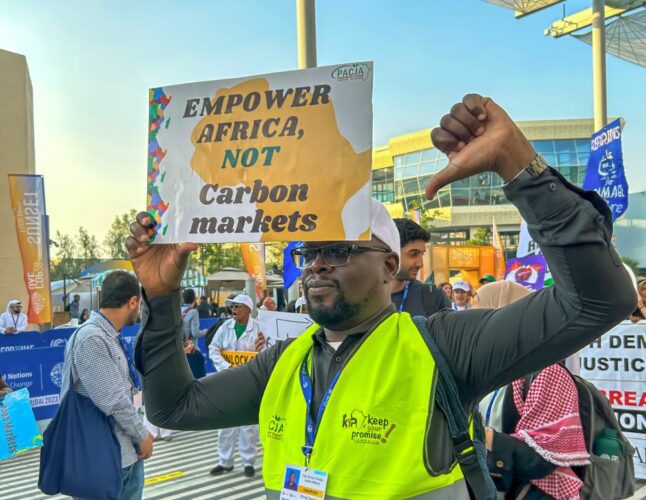Seth Onyango, bird story agency
In what is being hailed as an unprecedented agreement, delegates to COP28 in Dubai made the first official commitment to ditch fossil fuels, in a move set to spur green investment globally.
Dubbed as the ‘beginning of the end’ of the fossil fuel era, the agreement aims for a rapid and equitable shift, marked by substantial emissions reductions and enhanced financial support.
Negotiators from nearly 200 countries also agreed on the first-ever ‘global stocktake’ to boost climate action before the end of the decade, aiming to keep the global temperature increase below 1.5°C.
Although the agreement doesn’t completely ‘phase out’ fossil fuels as some had anticipated, it specifically targets a reduction in oil and gas dependency, challenging the long-standing reliance on these fuels in the global economy.
“Whilst we didn’t turn the page on the fossil fuel era in Dubai, this outcome is the beginning of the end,” said UN Climate Change Executive Secretary Simon Stiell in his closing speech.
“Now all governments and businesses need to turn these pledges into real-economy outcomes, without delay.”
The move will likely prompt many African economies to explore sustainable opportunities, with wind, solar and green hydrogen being the most likely recipients.
Africa, with its vast renewable energy resources, is uniquely positioned to lead the transition to sustainable power. This shift, however, requires significant financial and technological support – an issue which COP28 aims to address.
Two mechanisms – the Green Climate Fund and the Adaptation Fund – could mark a significant change in the way climate finance flows to Africa.
These funds are expected to inject much-needed capital into climate-resilient infrastructure projects, clean energy developments and adaptation initiatives.
While investments of this nature would stimulate job creation in emerging sectors and foster a new wave of green entrepreneurship and innovation, an emphasis on climate adaptation and resilience is set to help fortify African economies against climate-induced disruptions.
Climate finance took centre stage at COP28, with Stiell calling it the “great enabler of climate action.”
At the COP26 climate conference in Glasgow in 2021, climate experts demonstrated how Africa can contribute to global emission reduction owing to its massive green energy potential. Rich nations then pledged US$8.5 billion over the following five years to support South Africa’s decarbonisation efforts.
While the southern African country’s coal-dominated economy would require at least US$250 billion over three decades to move away from coal, the offer was seen as killing two birds with one stone – helping Africa abandon dirty fuels while ensuring it remains energy secure.
The Green Climate Fund (GCF) received a boost to its second replenishment, with six countries pledging new funding and total pledges now standing at a record USD 12.8 billion, with further contributions expected.
Eight donor governments announced new commitments to the Least Developed Countries Fund and Special Climate Change Fund totalling more than $174 million to date, while new pledges of some USD 188 million, were made to the Adaptation Fund.
However as highlighted in the global stocktake, these financial pledges are far short of the trillions of dollars eventually needed to support developing countries with clean energy transitions, implementing their national climate plans and adaptation efforts.
For Africa, massive, home-grown investment will also be needed.
South Africa has already pioneered plans to transition to renewable energy, but there has been resistance to the plan both from some sectors of government and from coal, oil and gas lobbies.
However, South Africa’s experience in piloting a new type of climate finance vehicle can help inform debates about how to fund a just transition from fossil fuels to renewable energy. With Africa standing to benefit from the mining of minerals that are key to the transition, there are plenty of opportunities to build new sectors – like green hydrogen initiatives in Namibia and at South Africa’s Boegoebaai as well as in Mauritania – and to adapt traditional sectors like mining to both benefit from and help to fund, the transition.
One example in mining is cobalt, a key component in the production of batteries for electric vehicles and renewable energy storage systems.
The Democratic Republic of Congo (DRC) is the world’s largest producer of cobalt, and Africa as a whole accounts for more than 70% of global cobalt production. Other critical minerals found in Africa include lithium, graphite, and rare earth elements.
Meanwhile, the call for enhanced Nationally Determined Contributions (NDCs) at COP28 by 2025 further compels African nations to adopt more rigorous climate policies.
This policy shift is anticipated to spur a wave of regulatory and market reforms, potentially attracting more foreign direct investment, especially in sustainable industries.
During COP28, dialogues progressed on establishing a ‘renewed, specific target for climate funding’ to be determined in 2024, with a focus on the requirements and key concerns of developing nations.
This fresh objective, commencing at a foundational figure of USD 100 billion annually, is set to serve as a crucial foundation for formulating and executing national climate strategies, slated for completion by 2025.- bird story agency.
Source link : https://thenewdawnliberia.com/cop28-landmark-deal-to-transition-from-fossils-fuels-is-a-unique-opportunity-for-africa/
Author :
Publish date : 2023-12-17 08:00:00
Copyright for syndicated content belongs to the linked Source.
